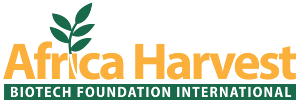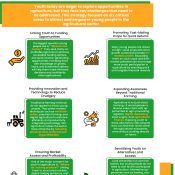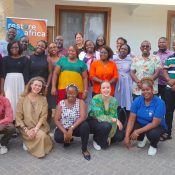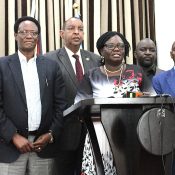
Restore Africa’s communicators gather in Kwale, Kenya, to strengthen collaboration for greater impact
By Rose Kawira, Multimedia Officer, Africa Harvest
“It is not business as usual. The Restore Africa Programme is unique! It requires all of us to be flexible and think creatively,” said Sally Armitage, Head of Media and Communications at Global Evergreening Alliance (GEA), at a recent communications learning and exchange workshop held from 24th to 28th February 2025 in Kwale County, Kenya.
The workshop, organized and convened by GEA’s Media and Communications team, brought together 26 communications focal persons drawn from 13 organizations that are implementing GEA’s Restore Africa (RESAf) programme in Kenya, Malawi, and Uganda. RESAf is the world’s largest nature-based, community-led land restoration and carbon removals programme.
The workshop objectives included unifying and deepening participants’ understanding of the program and its unique aspects, while strengthening their capacity in content creation, digital storytelling, media outreach, and crisis communication to enhance RESAf’s visibility. It also offered hands-on training in video production, photography, and social media management, and fostered knowledge-sharing among country teams and partners.
As part of the hands-on training, the participants visited some of the farmers engaged in the program in Kwale county practicing Farmer-Managed Natural Regeneration (FMNR) on their farm lands to document their experiences and the impact of the programme thus far.
One of the farmers met during the field visit, Fatuma Saidi Daro, shared, “In our Swahili language, we call FMNR ‘visiki hai.’ It will help reduce the adverse effects of climate change, bring back more reliable rainfall to our currently arid land, and enhance soil fertility, which will lead to increased productivity.”
In Kenya, Restore Africa aims to increase resilience and productivity of socio-ecological systems through restoration of 250,000 hectares of degraded land across five counties – Elgeyo Marakwet, Kilifi, Kwale, Migori, and Narok, and improve the livelihoods of 250,000 smallholder farmers and pastoralists (including women and youth) by 2052.
Overall, Restore Africa aims to restore over 1.8 million hectares of degraded to improve food security and the livelihoods of 1.5 million farming households while strengthening their resilience to climate change. It is currently being implemented in Kenya, Malawi, Uganda, with plans to extend to more countries in the region. is a farmer-led integrated
Participating organisations from Kenya included Africa Harvest Biotech Foundation International, World Vision Kenya (WVK), Self Help Africa, Green Belt Movement, Justdiggit, and the Center for International Forestry Research and World Agroforestry (CIFOR-ICRAF). Uganda was represented by Catholic Relief Services (CRS), CARE International, ECOTRUST, and Uganda Land Care Network (ULN), while Malawi’s attendees were from CARE International Malawi, World Vision Malawi, Catholic Relief Services (CRS), Catholic Development Commission in Malawi (CADECOM), Organization for Sustainable Socio-Economic Development Initiative Malawi (OSSEDI), and Total Land Care.
Job Mwangi, Communications and Advocacy Manager at the Green Belt Movement, praised the team’s strengths. “I am impressed by the depth of knowledge and expertise in communications and media that each of you brings. Every individual contributes a unique skill, making this an incredible team. Let’s work together to showcase the impact of the Restore Africa Programme,” he said.



